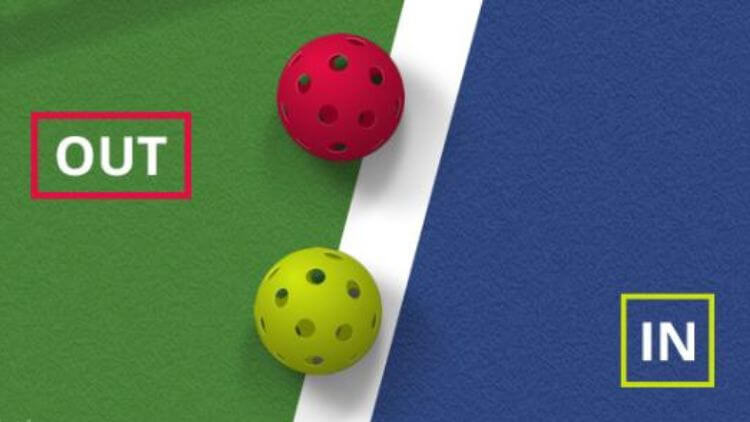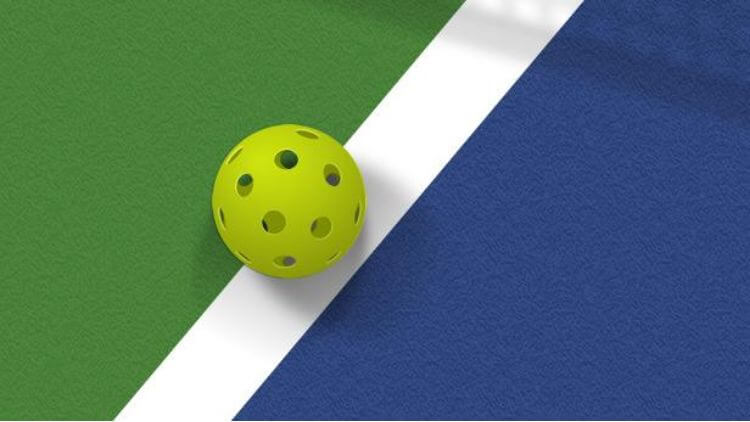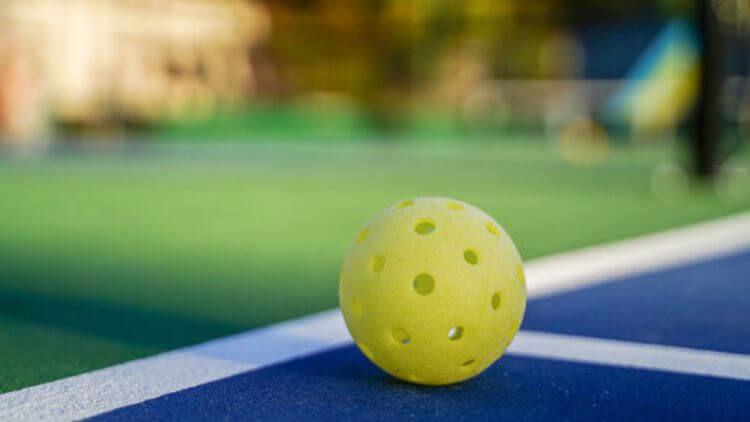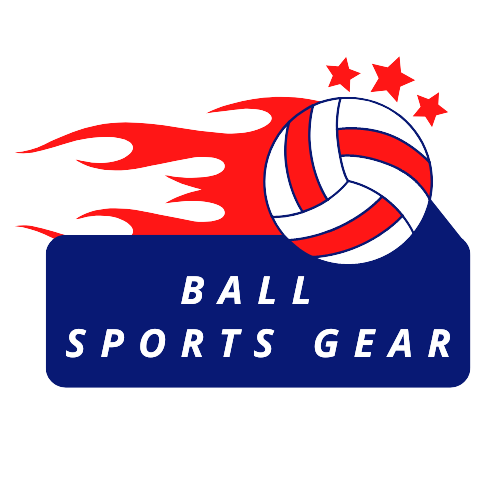Calling an out ball in pickleball is an essential aspect of the game that ensures fair play and accurate scoring. It involves making a judgment call when a ball lands outside the designated boundaries. Understanding the rules and guidelines for making these calls is crucial for maintaining integrity and sportsmanship on the pickleball court. In this FAQ, we will explore common questions related to calling an out ball in pickleball and provide insights into how players can handle this aspect of the game.
What Are the Three Rules for Calling a Ball Out in Pickleball?
Clear Sightline: The First Rule for Calling a Ball Out
To make an accurate call, a player must have a clear sightline of the ball’s landing spot. As the ball approaches, it’s vital to position yourself in a way that allows you to track its trajectory accurately. Be mindful of any obstacles, such as the net, posts, or players, which may obstruct your view. Maintaining a clear line of sight ensures fair judgment and minimizes any potential disputes during the game.
The Landing Zone: Identifying the Second Rule for Calling a Ball Out
In pickleball, the ball must land entirely outside the court boundaries to be considered out. The landing zone is defined by the inner boundaries of the court’s lines. It’s crucial to familiarize yourself with the dimensions of the court and the position of the lines. When calling an out ball, pay close attention to where the ball first makes contact with the ground. If any part of the ball touches the lines or lands inside the court, it is considered in play and not out.
Confidence and Honesty: The Third Rule for Calling a Ball Out
Confidence and honesty play a vital role in making accurate out calls. It is essential to trust your judgment and make the call decisively. If you are certain that the ball is out, confidently announce it to your opponents. On the other hand, if you are unsure about the ball’s status, it is best to give your opponent the benefit of the doubt and call the ball in. Honesty and integrity are fundamental principles in pickleball, fostering a respectful and sportsmanlike environment.
How to Call an Out Ball in Pickleball?

Understand the Rules:
Before delving into the specifics of calling an out ball, it’s essential to familiarize yourself with the official rules of pickleball. The rules governing out-of-bounds shots may vary slightly depending on the organization or tournament you’re participating in. However, the general principle remains the same – a ball is considered out if it lands outside the court boundaries, including the lines.
Position Yourself Correctly:
To make accurate calls, you need to position yourself appropriately on the court. Stand in the best possible vantage point to observe the ball’s trajectory and determine if it lands within the court boundaries. As a player, you have a responsibility to maintain integrity and fairness, so ensure you have a clear view of the ball’s landing spot.
Focus on the Ball:
Keep your eyes fixed on the ball throughout its flight to closely track its path. Concentrate on the precise moment it touches the ground or goes out of bounds. Quick reflexes and attentiveness are key to accurately calling an out ball, especially when the ball is moving rapidly.
Listen to the Sound:
In addition to visual cues, listening to the sound can help you determine whether a ball is in or out. A ball hitting the court surface will produce a distinct sound, and if it lands outside the court boundaries, the sound may differ. Pay attention to the auditory cues in conjunction with visual observations to enhance your decision-making process.
Seek Consensus:
In pickleball, players often call their own shots, but that doesn’t mean you should hesitate to seek consensus when unsure about a ball’s status. If you’re unsure about a call or if there is a dispute, consult your fellow players. Engaging in respectful communication and discussion can help resolve disagreements and ensure fair play.
Trust Your Instincts:
Over time, as you gain experience and improve your understanding of the game, your instincts will become more reliable. Trust your instincts when calling an out ball, especially if you have a clear view and feel confident in your judgment. Remember, the aim is to maintain a fair and sportsmanlike environment for everyone involved.
Benefits of Calling an Out Ball in Pickleball

Promotes Fair Play:
Calling an out ball is a fundamental aspect of fair play in pickleball. It demonstrates your respect for the rules and sportsmanship, ensuring a level playing field for both you and your opponents. By acknowledging when a ball lands outside the boundaries, you uphold the integrity of the game and foster a positive atmosphere for all players involved.
Builds Trust and Reputation:
In any sport, trust among players is vital. By consistently calling out balls correctly, you establish yourself as a trustworthy player in the pickleball community. Others will recognize your integrity, and your reputation as a fair player will grow. This trust and reputation can lead to more enjoyable and competitive matches, as players will feel comfortable playing with you.
Encourages Honesty and Accountability:
Calling an out ball requires honesty and accountability. It is not always easy to admit when a ball is out, especially in critical situations or close calls. However, by being honest in your calls, you set an example for others to follow. This fosters a culture of accountability within the pickleball community, where players take responsibility for their actions and uphold the principles of the game.
Improves Gameplay Flow:
When a player accurately calls an out ball, the game can flow smoothly without unnecessary interruptions. By promptly identifying out balls, players can continue the rally without disputes or delays. This keeps the momentum of the game intact and allows everyone involved to maintain their focus and concentration, resulting in a more enjoyable experience for all.
Demonstrates Sportsmanship:
Pickleball is not just about winning; it’s also about displaying good sportsmanship. Calling an out ball when it is genuinely out showcases your respect for the game and your opponents. It exemplifies your commitment to playing with integrity and fairness, which is an essential aspect of any sport. Your opponents will appreciate your sportsmanship, leading to a more positive playing environment for everyone.
Importance and Tips for Calling an Out Ball
In pickleball, calling an out ball accurately is essential to maintain fairness and sportsmanship. It is the responsibility of the player who hits the ball to make the call. This involves determining whether the ball has landed within the boundaries or outside. A correct call prevents disputes and promotes a positive playing environment. Here are some tips to help you improve your calling skills:
Positioning and Focus:
To make accurate line calls, it is important to position yourself in the best possible vantage point. Take a position where you have a clear view of the ball’s trajectory as it approaches the line. Avoid obstructing your line of sight by maintaining an appropriate distance from the net. Stay focused on the ball throughout its flight to accurately judge where it lands.
Know the Boundaries:
Familiarize yourself with the official pickleball court dimensions and boundary lines. This knowledge will help you determine whether the ball lands within the playing area or outside. Be aware of the sideline, baseline, and kitchen line. Practice visualizing these lines during your training sessions, which will improve your ability to make accurate calls during a match.
Communication and Confidence:
Effective communication is crucial in pickleball, especially when calling an out ball. Clearly and confidently announce your line call immediately after the ball lands. Use assertive language to convey your decision. For example, say “Out!” or “In!” loud enough for your opponents to hear. This helps in avoiding confusion or disagreements during the game.
Collaboration and Sportsmanship:
Pickleball is a social sport, and collaboration among players is highly encouraged. If you are uncertain about a line call, don’t hesitate to ask your opponents for their input. They may have had a better view of the ball and can help you make an accurate call. Remember to approach these discussions with a spirit of sportsmanship and respect for fair play.
Practice and Feedback:
Improving your calling skills requires practice and feedback. Engage in regular pickleball matches or practice sessions to sharpen your judgment and decision-making abilities. Seek feedback from experienced players or your peers on your line calling accuracy. Analyzing and incorporating constructive criticism will contribute to your growth as a player.

Frequently Asked Questions
A: In pickleball, there is no official referee, so players are responsible for making their own line calls. If there is a disagreement, it is generally encouraged to resolve it through sportsmanship and fair play. In friendly games, players may choose to replay the point. In more competitive situations, players may agree to use the “benefit of the doubt” rule, where the point goes to the hitter if there is uncertainty about the call.
A: In casual or recreational pickleball, players usually do not have line judges or access to technology for determining line calls. However, in more formal or competitive settings, such as tournaments, there may be designated line judges or the use of technology like Hawkeye systems to assist with making accurate calls.
A: While there are no universal rules for calling an out ball in pickleball, there are some common guidelines. Players should make the call immediately after the ball lands, be certain in their judgment, and use a clear and agreed-upon signal or verbal call. It’s important to maintain sportsmanship and respect for opponents when making line calls.
A: In recreational pickleball, there are typically no official penalties for making incorrect line calls. However, repeatedly making incorrect calls or deliberately making incorrect calls can lead to disputes and strained relationships with fellow players. In competitive settings, there may be specific penalties or consequences for intentionally making incorrect calls.
A: Improving line call accuracy in pickleball comes with experience and practice. Some tips for making more accurate calls include focusing on the flight path and landing location of the ball, positioning oneself to get the best view of the lines, and communicating with your partner or opponents to ensure fair calls. Additionally, attending rules clinics or training sessions can provide further guidance on making accurate line calls.
Conclusion
Calling an out ball in pickleball requires precision, fairness, and effective communication among players. By adhering to the guidelines and rules, players can ensure a level playing field and uphold the spirit of the game. While disagreements may occasionally arise, the importance of maintaining integrity and sportsmanship cannot be understated. With clear and immediate calls, players can foster a positive playing environment and enhance their pickleball experience. So, remember to stay focused, be honest in your calls, and enjoy the game of pickleball!

